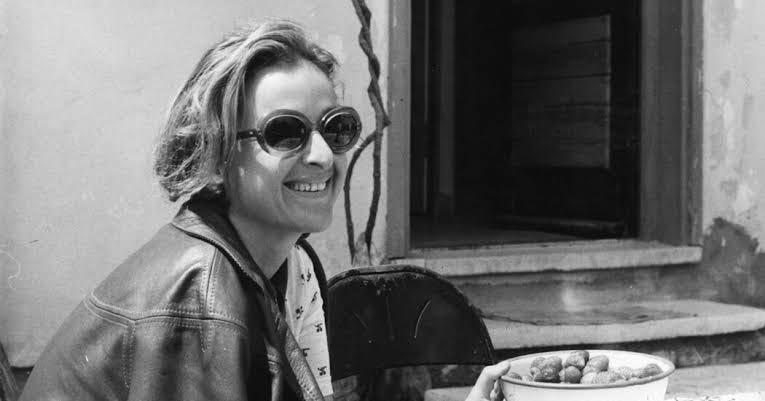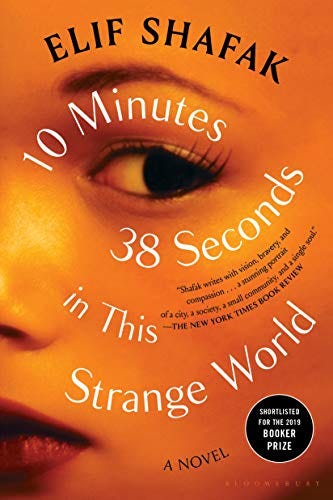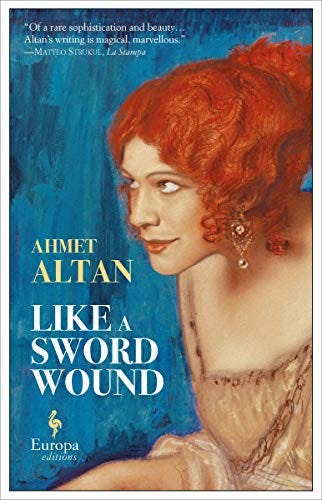I often check out the translated works listed under "Book Marks" at LitHub, and keep being amazed at the cascade of titles, despite knowing how little of the world's literature can be read by non-speakers of the original language.
The sliver of me still capable of believing such a thing wants to say that in our fraught era we urgently need these works. Does familiarity breed contempt? But isn't unfamiliarity worse? Doesn't it breed the false narrative of exceptionalism?1 Our egos ask us to believe we're "special"—in the sense of being one of a kind, endowed with inalienable rights, worthy.2 But how toxic this idea becomes without a counter-balancing sense of family, community, social fabric—in short, without the bedrock belief that others are as "special" as we are.
In Dangerous Sentences [my, alas, never-published book of craft essays], I urged readers to escape the ghetto of the here and now. This encouragement is at the heart of David's Lists 2.0. Despite all the Death of the Novel talk a generation ago, and plummet-ing enrollments in Humanities programs, we have scads of readers, and scads of books are being published—more than ever. But, mirroring the problem of income inequality, a few writers attract most of the readers.3
Here’s a title from the earlier Translation posts:
Dawn, Sevgi Soysal, first published in Turkish in 1975, original title, Şafak [Maureen Freely's English translation (2022) from Archipelago Books].
The story in a nutshell [from the front flap because I can put it no better]:
As the sun bears down on Adana, cups of raki are passed to the guests of a dinner party at Ali's. Among the diners are a journalist named Oya, who has recently been released from prison, and her new acquaintance, Mustafa. Together they debate communism, and socialism, tossing words around the room "like hot peppers." When police raid Ali's home, his guests are carted off to holding cells, where they are interrogated on charges of harboring leftist sympathies. They are tortured throughout the night.
Don't let that last sentence keep you from this novel. A character is beaten, true, but the story's real focus is the impact of a repressive regime on the inner lives of ordinary citizens. It feels as timely today as it must have fifty years ago. Soysal was herself a political prisoner (her other major work was a memoir of prison life). Sadly, she died of cancer at age forty.
https://archipelagobooks.org/book_author/sevgi-soysal/
https://en.wikipedia.org/wiki/Sevgi_Soysal
Orhan Pamhuk is the Turkish writer American readers are likely to know:
https://www.orhanpamuk.net/
Here's one of the Guardian's "top ten" book lists to suggest other names:
Elif Shafak is represented by The Flea Palace (2002), which I haven't read, but I can vouch for two others, 10 Minutes 38 Seconds in This Strange World (2018) and Three Daughters of Eve (2016). Shafak writes in both Turkish and English.
You should also know about journalist and novelist, Ahmed Altan. Altan was sen-tenced to life imprisonment in the Turkish government's crackdown on opposition media. He was freed once, re-arrested; in 2021, aided by the international literary community, his case overturned and he was finally released.
Europa Editions has brought out handsome editions of the first two volumes of the Ottoman Quartet: Like A Sword Wound (1997) and Love in the Days of Rebellion (2001). Both are beautifully translated, absorbing reads. The third book, Dying Is Easier than Loving (2015) has just appeared.
https://en.wikipedia.org/wiki/Ahmet_Altan
Speaking of “exceptionalism”: I've always admired the clarity of William Saroyan's statement, released when he died: “Everybody has got to die, but I have always believed an exception would be made in my case.”
Unless we've been bamboozled by the doctrine of "original sin." [As my wife would say, Don't get me started . . .]
I remember sitting at a table at a book fair with two other writers after our panel discussion. The three of us chatted amongst ourselves while watching the line in front of Terry Tempest Williams' table snake back and forth like the queue outside airport security.









Thank you David for yet another thought provoking post. I read Orhan Pamuk’s work when I was much younger, maybe 10 years ago in my early 20s. I found it really difficult to read then, but perhaps will find it easier now. On the topic of translated works, I share your sentiment that it is important to read widely beyond one’s own culture and language. I find the little turns of phrases from other languages to be quite evocative and sometimes much more impactful than what we are accustomed to in our own language. Can I suggest, if you are interested in reading work written by those from different linguistic and cultural backgrounds, that you visit my friend’s magazine, be:longing – it is a publication specifically focusing on personal experiences of migration, cross-culture and belonging. Rather an important literary addition to today’s fraught society, as you put it!
www.belongingmag.com if you’re interested!
PS I have not emailed you yet, but will be doing so soon.